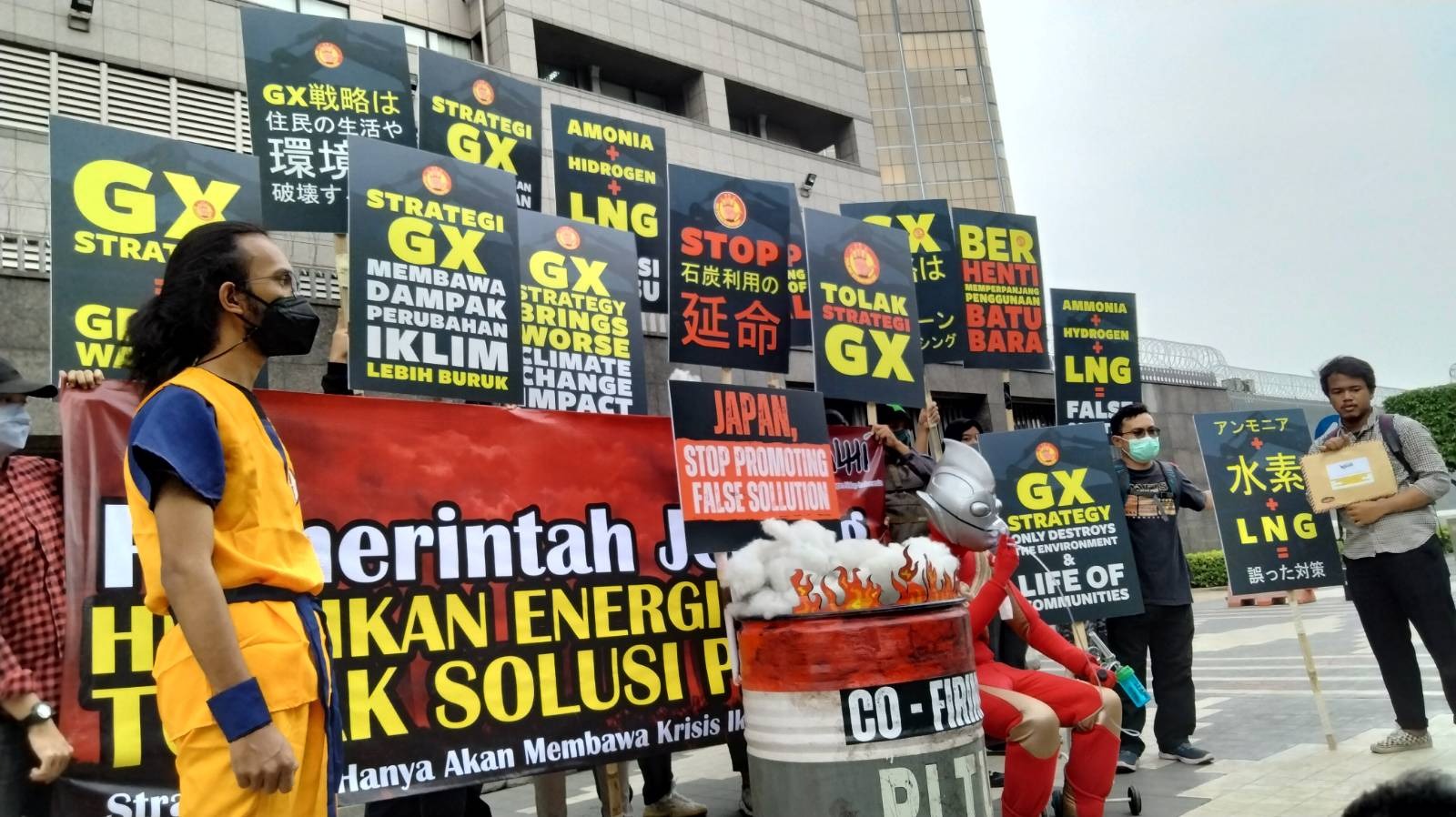
To Prime Minister Kishida Fumio:
The Japanese government is the world’s largest provider of public finance for fossil fuels and is promoting technologies that will prolong their use. Under the guise of decarbonization in the energy sector, the Japanese government is actively promoting hydrogen and ammonia, carbon capture and storage (CCS), nuclear, biomass and liquid natural gas (LNG) internationally and domestically. For the upcoming 27th UN Climate Change Conference (COP27), 56 organizations from 29 countries, urge the Japanese government to end its international public finance for fossil fuels and stop promoting “false solutions” to the climate crisis.
The climate crisis is an existential crisis that is harming people and our planet. Heavy rains since June 2022 caused devastating damage to Pakistan, with one third of the country submerged underwater. Super Typhoon Noru hit the Philippines forcing thousands to flee. Forest fires are getting worse killing animals and devastating lands. In Japan, people are suffering from intense heat waves, strong typhoons and heavy rains. We have no time to waste trying out these false solutions on our way to limit global warming to below 1.5 degrees Celsius.
Hydrogen/Ammonia co-firing increases dependence on fossil fuels
Currently, almost all available hydrogen and ammonia are derived from fossil fuels and there is little green hydrogen and ammonia produced using renewable energy[1]. While hydrogen and ammonia do not emit greenhouse gases when they are burned, they emit large amounts of greenhouse gases during their production and/or transportation. Even with the most advanced equipment, approximately 1.6 tons of CO2 is emitted to produce 1 ton of ammonia. Similarly, hydrogen is hardly a “decarbonized” fuel[2]. In other words, the greenhouse gas emission reduction effect of mixed combustion of hydrogen and ammonia is quite limited. Furthermore, researchers have found that blue hydrogen co-firing can produce more greenhouse gas emissions than conventional gas-fired power generation[3].
Co-firing of hydrogen and ammonia has been promoted by the Japanese government, which leads to prolonging the lifespan of existing thermal power generation. For example, the Japan International Cooperation Agency (JICA) has developed a roadmap for achieving carbon neutrality by 2060 in Indonesia. To achieve the roadmap, it has proposed positioning ammonia, hydrogen, and LNG (with CCS) as the three main fuels, prioritizing support for ammonia and biomass co-firing at existing coal-fired power plants in the short term, and hydrogen thermal power (assuming dependence on imported gas for hydrogen) accounting for a large proportion of the power source mix after 2051. Japanese companies have already announced feasibility studies and pilot projects in Indonesia one after another.
JICA is also currently providing technical assistance to the Government of Bangladesh through Official Development Assistance (ODA) for the development of the Integrated Energy and Power Master Plan. It would introduce large-scale thermal power generation using mixed combustion of hydrogen and ammonia. This is based on unrealistic assumptions, such as the introduction of coal-fired power generation using 50% ammonia combustion around 2030. As of 2022, Japanese companies are still conducting demonstration testing to achieve 20% combustion. The potential of renewable energy use is downplayed compared to the other JICA survey report.
Hydrogen, ammonia, and CCS will not reduce greenhouse gas emissions and are riddled with economic and technological uncertainty. CCS, which is a prerequisite for the use of blue hydrogen and ammonia, has rarely been commercialized, and problems such as high cost and incomplete CO2 recovery have been pointed out[4]. Supporting these fuels and technologies as necessary for the energy transition is nothing less than the imposition of false solutions. The Japanese government, therefore, should immediately stop promoting these false solutions.
LNG is not a “Transition Energy”
The Japanese government is driving the expansion of LNG markets across Asia and globally but this poses considerable risks to decarbonization, energy security, and environmental protection. While these efforts are being made in the name of Japan’s energy security, promoting fossil fuel gas in Asia contradicts climate change measures, and undermines energy stability and supply for Asian countries, including Japan, in light of currently soaring gas prices.
The IPCC estimates that the fossil fuel infrastructure currently in operation and planned to operate for an expected years of operation would alone produce enough CO2 to cause global temperatures to rise by more than 2°C[5]. In light of climate science, there is no room for new fossil fuels including gas. Also the think tank Carbon Tracker points out that gas-fired power plants need to be phased out by 2045, while developed countries need to do so before then[6]. Therefore, there is a high possibility that investment in these projects will not be recovered and they will become stranded assets.
Moreover, methane, a major component of gas, has been underestimated in its contribution to global warming[7]. As 40% of anthropogenic methane emissions come from energy sources[8], the use of fossil fuels must be reduced from the perspective of methane emission reduction.
We also cannot ignore the environmental and social problems caused by the LNG development. The Japan Bank for International Cooperation (JBIC) and Osaka Gas are investing in the development of the Ilijan LNG import terminal project in Batangas, Philippines. Alarms have been raised over the adverse effects on rich marine ecosystems in the Verde Island Passage (VIP), known as the “the Amazon of the Oceans,” by the project[9]. In addition, there have been reports of environmental destruction and human rights violations against indigenous peoples in many gas development projects that have been promoted overseas by the Japanese public and private sectors[10]. Japanese public and private investments in gas projects not only delay the transition, but also put local residents and the environment at risk.
Billions of Japanese finance in fossil fuels must end and shift towards clean and sustainable energy
Japan is one of the world’s largest financiers of fossil fuels and spends over $10 billion on average each year on fossil fuels according to Oil Change International and FoE U.S. data. This government-backed financing of fossil fuels through public financial institutions abroad was more than eight times larger than Japan’s international assistance for renewable energy, which averaged $1.3 billion per year[11].
In the communique adopted at the 2022 G7 Summit, the G7 leaders conditionally committed to ending new international public support for the fossil fuel energy sector by the end of 2022[12], [13]. Japan, as the chair of the G7 next year and as the country with huge historical responsibility for the climate crisis, should make substantial progress to phase out public financing for fossil fuel projects immediately.
Leading up to the COP27 taking place in Egypt, Japan must show its real commitment and climate action. Climate change is a matter of urgency. We urge the Government of Japan to stop financing fossil fuels and promoting false solutions and instead shift finance towards clean energy that meets the needs of communities, consistent with the goals of the Paris Agreement.
Initial signatories (7 organizations):
Friends of the Earth Japan
350.org Japan
Japan Center for a Sustainable Environment and Society (JACSES)
Mekong Watch
Kiko Network
Asian Peoples’ Movement on Debt and Development (APMDD)
Oil Change International
Endorsed by (49 organizations from 29 countries):
350.org, Global
NGO Forum on ADB, Regional-Asia
Jubilee Australia Research Centre, Australia
GLOBAL 2000, Austria
Bangladesh Environmental Lawyers Association, Bangladesh
Bangladesh Working Group on External Debt (BWGED), Bangladesh
CLEAN (Coastal Livelihood and Environmental Action Network), Bangladesh
Friends of the Earth Europe, Belgium
NOAH – Friends of the Earth Denmark, Denmark
CESTA Friends of the Earth El Salvador, El Salvador
Maan ystävät / Friends of the Earth Finland, Finland
Les Amis de la Terre, France
urgewald, Germany
Alliance for Empowering Rural Communities, Ghana
AbibiNsroma Foundation. Ghana
ENVIRONICS TRUST, India
Centre for Financial Accountability, India
National Hawker Federation,India
Wahana Lingkungan Hidup Indonesia (WALHI), Indonesia
AEER, Indonesia
Trend Asia, Indonesia
ReCommon, Italy
Save the Earth! Action97, Japan
Oiso Ene Shift, Japan
CASA (Citizens’ Alliance for Saving the Atmosphere and the Earth), Japan
Sahabat Alam Malaysia (Friends of the Earth Malaysia), Malaysia
Climate Action Network Southeast Asia, Malaysia
Oyu Tolgoi Watch, Mongolia
Rivers without Boundaries, Mongolia
FoE Nepal, Nepal
Both ENDS, Netherlands
Just Finance International, Netherlands
Aotearoa Plastic Pollution Alliance, Aotearoa New Zealand
Association Nigérienne des Scouts de lEnvironnement (ANSEN), Niger
Pakistan Fisherfolk Forum, Pakistan
Indus Consortium, Pakistan
Pakistan Fisherfolk Forum, Pakistan
Center for Energy, Ecology, and Development (CEED), Philippines
People of Asia for Climate Solutions, Philippines
Center for Renewable Energy and Sustainable Technology (CREST), Philippines
Korea Federation of Environmental Movement (KFEM) – FoE Korea, Republic of Korea
Friends of the Earth Africa, South Africa
SFOC, South Korea
Jordens Vänner / Friends of the Earth Sweden, Sweden
Taiwan Watch Institute, Taiwan
The Corner House, UK
Mighty Earth, USA
Friends of the Earth United States, USA
Vietnam Zero Waste Alliance, Vietnam
…
Cc:
Mr. HAYASHI Yoshimasa, Minister for Foreign Affairs
Mr. SUZUKI Shunichi, Minister of Finance
Mr. NISHIMURA Yasutoshi, Minister of Economy, Trade and Industry
Mr. NISHIMURA Akihiro, Minister of the Environment
Mr. TAKEI Shunsuke, State Minister for Foreign Affairs
Mr. YAMADA Kenji, State Minister for Foreign Affairs
Mr. INOUE Takahiro, State Minister of Finance
Mr. AKINO Kozo, State Minister of Finance
Mr. NAKATANI Shinichi, State Minister of Economy, Trade and Industry
Ms. OTA Fusae, State Minister of Economy, Trade and Industry
Ms. YAMADA Miki, State Minister of the Environment
Mr. KOBAYASHI Shigeki, State Minister of the Environment
Mr. TANAKA Akihiko, President, Japan International Cooperation Agency (JICA)
Mr. HAYASHI Nobumitsu, Governor, Japan Bank for International Cooperation (JBIC)
Mr. KURODA Atsuo, Chairman and CEO, Nippon Export and Investment Insurance (NEXI)
*****
Contact:
Yuki Tanabe, Japan Center for a Sustainable Environment and Society (JACSES), tanabe@jacses.org
Ayumi Fukakusa, Friends of the Earth Japan, fukakusa@foejapan.org
*****
Footnotes:
[1] According to IEA, only less than 0.03 % of hydrogen produced in 2020 were made through water electrolysis. IEA, “Global Hydrogen Review 2021” , Nov 2021 https://iea.blob.core.windows.net/assets/5bd46d7b-906a-4429-abda-e9c507a62341/GlobalHydrogenReview2021.pdf
[2] Kiko Network, “Position Paper: Challenges of Hydrogen and Ammonia”, Oct 2021, https://beyond-coal.jp/beyond-coal/wp-content/uploads/2021/10/posision-paper-hydrogen-ammonia_english_revised220121.pdf
[3] Robert W. Howarth,Mark Z. Jacobson, ”How green is blue hydrogen?”, Aug 12th 2021, https://onlinelibrary.wiley.com/doi/full/10.1002/ese3.956
[4] Renewable Energy Institute, “Bottlenecks and Risks of CCS Thermal Power Policy in Japan”, May 2022 https://www.renewable-ei.org/en/activities/reports/20220520.php, IEEFA U.S., ”Mothballing of Petra Nova carbon capture project shows likely fate of other coal-fired CCS initiatives” Aug 2020
[5] IPCC ”Climate Change 2022 Mitigation of Climate Change, Summary for Policy Makers” (AR6 WG3), 2022
[6] Climate Analytics, “Fossil gas: a bridge to nowhere”, Jun 2022
[7] https://www.nature.com/articles/s41560-022-01060-3
[8] IEA, Global Methane Tracker 2022 Overview, Fb 2022, https://www.iea.org/reports/global-methane-tracker-2022
[9] “Protect VIP” https://www.protectvip.org/
[10] For more details on individual projects, please visit https://sekitan.jp/jbic/en/issue
[11] Oil Change International and FoE U.S., “Past Last Call: G20 public finance institutions are still bankrolling fossil fuels”, Oct 28 2021, https://priceofoil.org/2021/10/28/past-last-call-g20-public-finance-institutions-are-still-bankrolling-fossil-fuels/
[12] In general, abatement means CCS, but the Japanese government claims that mixed combustion of ammonia and hydrogen can also be a possible measure of abatement. For more information “Joint Statement: Japanese government should recall its interpretation of OECD rules on coal – official support should not be provided for ammonia co-firing”, February 25, 2022 http://jacses.org/en/314/, Also, IPCC AR6 (WG3) states that ” ‘unabated fossil fuels’ refers to fossil fuels produced and used without interventions that substantially reduce the amount of GHG emitted throughout the life-cycle; for example, capturing 90% or more from power plants,”
[13] G7 Leaders‘ Communique, June 28, 2022 https://www.mofa.go.jp/mofaj/files/100364051.pdf

